|
|
|
Sort Order |
|
|
|
Items / Page
|
|
|
|
|
|
|
| Srl | Item |
| 1 |
ID:
178931
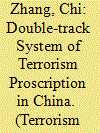

|
|
|
|
|
| Summary/Abstract |
This paper contributes to the debate on terrorism designation and proscription by providing information and analysis on the “double-track” system of terrorism designation and proscription in China. It calls for greater attention to China’s terrorism proscription system as China has increased its engagement in international affairs and became more willing and capable of international cooperation in counterterrorism. The case of China provides important insights from a non-Western perspective into how states function in dealing with the challenge terrorism poses. In particular, it examines China’s efforts in balancing effective counterterrorism and the accountability of the government. Adopting an interpretivist approach based on primarily Chinese-language documents, it traces the development of China’s proscription regime since 2003 to illustrate its evolution from ad-hoc list-making to a more complicated system. Because of the difficulties in collecting information and presenting it as admissible evidence in court, like many other countries, China relies on the executive for terrorism designation and proscription. While the workings of China’s proscription system demonstrates authoritarian characteristics, the development of its proscription regime reveals how it sought to respond to the concerns about the legitimacy of its counterterrorism practice, for example, on issues of due process and presumption of innocence.
|
|
|
|
|
|
|
|
|
|
|
|
|
|
|
|
| 2 |
ID:
152407
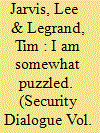

|
|
|
|
|
| Summary/Abstract |
A recent wave of scholarship has drawn attention to the need for further engagement with the role of ‘the audience’ in securitization ‘games’. This article contributes to this discussion both theoretically and empirically by exploring the types of question an audience may ask of a securitizing actor before a securitizing act meets with success or failure. To do this, it offers a discursive analysis of all 27 UK parliamentary debates on the extension of proscription powers to additional terrorist organizations between 2002 and 2014. We argue first that these debates are characterized by a wide range of questions relating to the timing, criteria, mechanics, consequences and exclusions of proscription; and second, that these questions function as demands upon the executive to variously justify, explain, clarify, elaborate and defend decisions to extend the UK’s list of designated groups. Taking these questions seriously, we suggest, therefore allows insight into a variety of ways in which audiences might participate in security politics that are not adequately captured by notions of consent or resistance, or success or failure. This has empirical and theoretical value for understanding proscription, parliamentary discourse and securitization alike.
|
|
|
|
|
|
|
|
|
|
|
|
|
|
|
|
| 3 |
ID:
159890
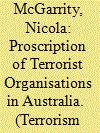

|
|
|
|
|
| Summary/Abstract |
Australia has a long history of legislation enabling the proscription of organisations which pose a threat to Australian security. Such laws are by no means a post-9/11 phenomenon. However, the proscription of organisations has assumed a particularly significant place in this country’s legislative response to the threat of terrorism since the terrorist attacks in New York and Washington. The focus of this article is upon the provisions of Division 102 of the Criminal Code Act 1995 (Cth), as it is this regime which has been most commonly relied upon in practice. Whilst the nature of the threat of terrorism faced by Australia has moved through several distinct phases, the basic structure of this regime has remained substantially intact. For that reason, although this article will canvass recent legislative amendments made in response to the foreign terrorist fighters phenomenon specifically, the aim is to provide a holistic picture of the form and substance of the proscription regime in Division 102. This builds upon the pre-existing scholarship in the field by carefully analysing the lessons which can be drawn from the now quite significant number of prosecutions for terrorist organisation offences.
|
|
|
|
|
|
|
|
|
|
|
|
|
|
|
|
| 4 |
ID:
159889
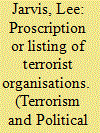

|
|
|
|
|
| Summary/Abstract |
This article serves as an introduction to this Special Issue on the banning or proscription of terrorist organisations around the world. It begins by arguing for greater attention to proscription powers because of their contemporary ubiquity, considerable historical lineage, implications for political life, and ambiguous effectiveness. Following an overview of the Issue’s questions and ambitions, the article discusses five themes: key moments of continuity and change within proscription regimes around the world; the significance of domestic political and legal contexts and institutions; the value of this power in countering terrorism and beyond; a range of prominent criticisms of proscription, including around civil liberties; and the significance of language and other symbolic practices in the justification and extension of proscription powers. We conclude by sketching the arguments and contributions of the subsequent articles in this Issue.
|
|
|
|
|
|
|
|
|
|
|
|
|
|
|
|
| 5 |
ID:
159896
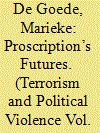

|
|
|
|
|
| Summary/Abstract |
Proscription of individuals and groups potentially linked to terrorism in the form of targeted sanctions have become increasingly controversial in recent years, especially in Europe. Initially considered the less violent alternative when countering terrorism, individual proscriptions have become contested for their impact on due process rights and democratic space. This paper focuses on a key aspect of proscription measures that goes relatively unnoticed: its discourses and practices of time and temporality. It analyses in some depth the rationalities of time evoked, debated, accepted, and rejected in two court cases on individual sanctions. It focuses on two elements at work in these cases: first, the relation between the precautionary and the punitive; second, the politics of establishing and examining terrorist intention. In this manner, it contributes to broader literatures on proscription in two ways. First, it advances the debate on security temporalities in general and the discussion of future-oriented sanctions in particular, by focusing on recent cases and case-law. Second, the paper brings a focus on legal practice to proscription debates. The paper concludes that the juridical repertoire of establishing and assessing intentions is not just broadened but fundamentally altered in the current proscription regime.
|
|
|
|
|
|
|
|
|
|
|
|
|
|
|
|
| 6 |
ID:
159895
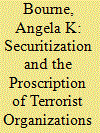

|
|
|
|
|
| Summary/Abstract |
This article applies securitization theory to account for the proscription of organizations linked to Euskadi Ta Askatasuna (ETA) in Spain. I argue that securitization is vital for understanding the evolution of Spanish counterterrorism policy from tolerating to banning political organisations not directly involved in terrorist attacks, but supporting and sympathetic to ETA. More specifically, I examine the role of the judiciary in the initiation of securitization processes in which ETA came to be conceived as a “complex structure” integrating armed and unarmed activists, and the resonance of judicial securitization frames in the public sphere. I do so by analysing evolving conceptions of the relationship between ETA and two organizations—the youth group Jarrai and its successors Haika and Segi and the ETA prisoners’ lobby Gestoras proAmnistía and its successor Alkatasuna—as articulated in court rulings and a sample of 573 newspaper articles published in the Spanish daily El País between 1994 and 2016. I argue that two modes of securitization can be observed in these cases, one extending security threats posed by ETA’s terrorist strategy to the political organizations and one framing both the terrorist group and political organizations as threats to the democratic community.
|
|
|
|
|
|
|
|
|
|
|
|
|
|
|
|
| 7 |
ID:
159894
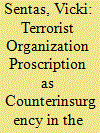

|
|
|
|
|
| Summary/Abstract |
Proscription—the designation of non-state actors as terrorist organizations—operates as one technique of counterterrorism listing, whereby individuals and populations associated with armed non-state actors are targeted for disruption, stigmatisation, and prosecution. This article examines the effects of the globalised proscription of the Kurdistan Workers’ Party (PKK) on the Kurdish conflict as a mode of counterinsurgency warfare. It argues that calling proscription a counterinsurgency strategy better connects its preemptive functions and objects with its deleterious effects on targeted populations. Moreover, this article argues that the transnational organization of the ban of the PKK casts light on how proscription extends and deepens colonial practices of counterinsurgency.
|
|
|
|
|
|
|
|
|
|
|
|
|
|
|
|
| 8 |
ID:
159891


|
|
|
|
|
| Summary/Abstract |
Proscription orders in UK legislation against terrorist groups have proliferated since 9/11. Added to the dozen or so Northern Ireland terrorist groups, around 70 international groups and one domestic neo-Nazi group have joined the list. Since that time, only two organisations have been deproscribed, and the UK government has resisted the periodic revision of listings and changes to the procedures for challenge and removal. The paper will consider the effectiveness and fairness of UK law in regard to the persistence of proscription, having regard to policy, legal, and practical frameworks and implications.
|
|
|
|
|
|
|
|
|
|
|
|
|
|
|
|
| 9 |
ID:
159892
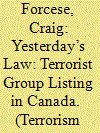

|
|
|
|
|
| Summary/Abstract |
Canada’s approach to proscription differs from that of other Westminster democracies. After the negative example of listing in the October Crisis, 1970 and with the subsequent advent of a constitutional bill of rights, Canada does not ban organizations; instead it penalizes certain forms of conduct, above mere membership, with terrorist groups. “Terrorist groups” include entities listed proactively by the executive, but also entities that meet a functional definition in Canadian criminal law. In practice, the latter, functionally-defined terrorist groups have figured in most terrorism prosecutions—only a few cases have involved listed groups. With the new focus on Daesh (a listed group), that may begin to change. However, executive listing raises unresolved constitutional doubts in Canada, prompting concerns that reliance on proscription may be more trouble than it is worth. Listing has also been used with respect to individuals, but such listings in Canada have already produced false positives, perhaps because of the due process deficits of listing by the executive. In many respects, therefore, terrorist group listing is yesterday’s law, problematic and of marginal utility. There may be reasons of administrative expediency to preserve listing, but the tool is more doubtful when used as a precursor to criminal prosecutions.
|
|
|
|
|
|
|
|
|
|
|
|
|
|
|
|
|
|
|
|
|